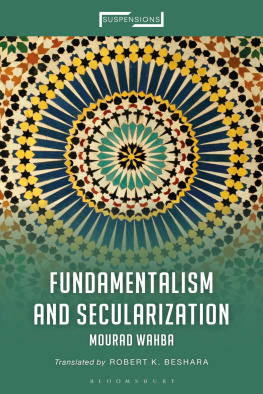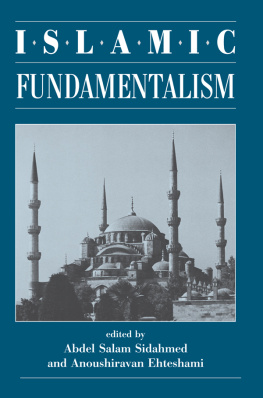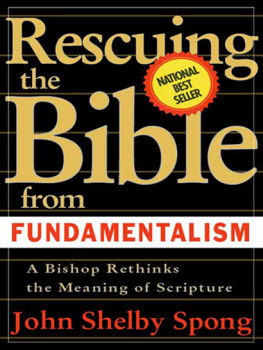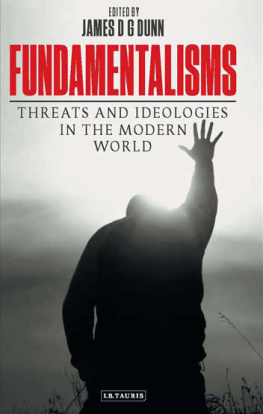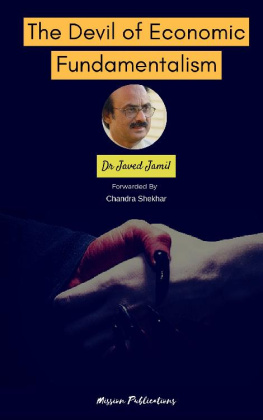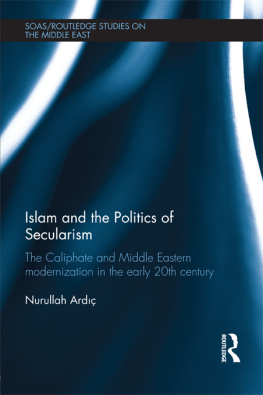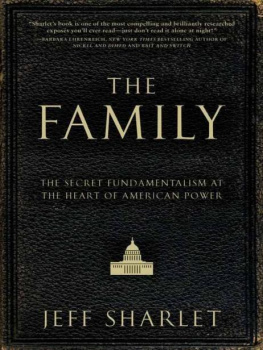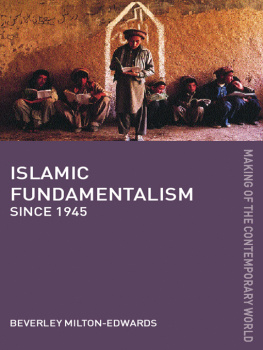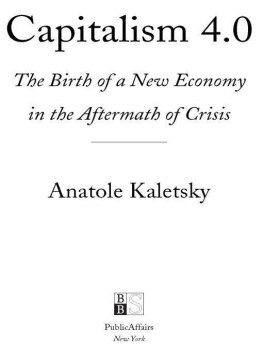Fundamentalism and Secularization
Suspensions: Contemporary Middle Eastern and Islamicate Thought
Series editors: Jason Bahbak Mohaghegh and LucianStone
This series interrupts standardized discourses involving the Middle East and the Islamicate world by introducing creative and emerging ideas. The incisive works included in this series provide a counterpoint to the reigning canons of theory, theology, philosophy, literature, and criticism through investigations of vast experiential typologiessuch as violence, mourning, vulnerability, tension, and humourin light of contemporary Middle Eastern and Islamicate thought.
Other titles in this series include:
Gilles Deleuze, Postcolonial Theory, and the Philosophy of Limit , Rda Bensmaa
The Quran and Modern Arabic Literary Criticism: From Taha to Nasr , MohammadSalama
Hostage Spaces of the Contemporary Islamicate World , DejanLukic
On the Arab Revolts and the Iranian Revolution , Arshin Adib-Moghaddam
The Politics of Writing Islam , MahmutMutman
The Writing of Violence in the Middle East , Jason Bahbak Mohaghegh
Iranian Identity and Cosmopolitanism , edited by LucianStone
Continental Philosophy and the Palestinian Question , by Zahi Zalloua
Sorcery, Totem and Jihad , ChristopherWise
Orientalism and Imperialism , AndrewWilcox
Traces of Racial Exception , RonitLentin
Transgression and the Inexistent, Mehdi Belhaj Kacem
Plural Maghreb: Writings on Postcolonialism, Abdelkebir Khatibi
Revolutionary Bodies, K.S. Batmanghelichi
Contesting Islam, Constructing Race and Sexuality, Sunera Thobani
Fundamentalism and Secularization
MOURAD WAHBA
Translated and Edited by
Robert K. Beshara

Contents
This translation would not have been possible without the full encouragement of both Professor Mourad Wahba and his son, Dr. Magdy Mourad. To the Wahbas, I am eternally grateful! I also see this collaboration as the beginning of a long-term translation project of not only other books by Professor Wahba but also different contemporary classics of Arabic philosophy. I thank my editors at Bloomsbury (Liza Thompson and Lucy Russell) for believing in this effort, which makes accessible to a curious and philosophically oriented English-speaking audience a sample of North African philosophy. Finally, what would scholars do without the love and support of their family, friends, and colleagues? Many thanks to Cony Garrido (who read the manuscript a few times to check for typos), Khairy Beshara (who introduced me to the work of Mourad Wahba), Alberto Hernandez-Lemus (who introduced me to work of Sadik Al Azm, another important thinker from the Arab world), Lewis Gordon (who made me realize Wahbas significance within Africana philosophy), and Zahi Zalloua (who recommended Bloomsbury to me). Not mentioning Ian Parker, Olfmi Tw, and Zeyad el Nabolsy who helped me in one way or another regarding this project.
Robert Beshara: Please introduce yourself, Professor Mourad Wahba, for the reader who may not be familiar with your work as a philosopher.
Mourad Wahba: My philosophical school of thought is against dogmatism and for relativity as a style of thinking as opposed to a belief. Therefore, I am against saying that the mind is capable of bearing the Absolute Truth. In this context, I began researching a property, which was not being researched as much as agricultural property and industrial property. Epistemic property was not seen as significant when, in my judgment, it is more important than the other two properties, for it is the one that either supports or undermines civilizational progress. Secularization negates the grasping of the Absolute Truth; fundamentalism, on the other hand, claims the negation of this negation. Creativity ceases with fundamentalism. If creativity is the beginning of agricultural technique, which is the reason civilization exists, then the human must be defined as a creative animal first and a social animal second. And if creativity knows no limits then the mind, by default, transcends limits and is capable, consequently, of forming a rational cosmic visiona vision that permits, in its formation, three unified sciences: physics, politics, and philosophy. The natural sciences are embedded within physics, the social and human sciences are part of politics, and philosophy unites the first two sciences. Since these three sciences begin with the letter P in English, then one can call them the three P sciences.
RB: Your book, Fundamentalism and Secularization , was published in 1995 but it remains relevant to this day in 2019, and, in my opinion, will remain relevant for the foreseeable future. In many ways, I see it as a visionary work of philosophy and theory because the book unpacks and historicizes significant concepts and also deals with important social issues six years before the tragic events on 9/11 and George W. Bushs subsequent launch of the war on terror, which is, of course, ongoing. Having said that, what inspired you to write the book? How was it received in 1995? And how do you think it will be received today, especially as an English translation? How do you feel about the translation and the possibility of this book reaching a wider audience now?
MW: Dr. Rev. Samuel Habib, the president of the Protestant Churches of Egypt, is the one who drove me to write this book after my conversations with him and with other Reverends, who belong to this denomination [i.e., Coptic Evangelical Organization for Social Services or CEOSS]. He felt that I held a futuristic vision that involved new terms and which was worthy of being published on a large scale. Therefore, it was natural for the book to be released through Dar El Thaqafa [The House of Culture], which belongs to CEOSS. The paradox here is that neither the print media nor broadcast media commented upon the book. Moreover, a second edition was never published despite the book selling out. However, I expect the English translation of this book will become popular and widespread throughout the Western world, which currently suffers from a religious terrorism, spawned from religious fundamentalisms. One can even say that the translator, Dr. Robert Beshara, is the author of the English version of this book, especially since he has a command of both English and Arabic.
RB: One of the most impressive aspects of the book is your mastery of both Euro-American philosophy and Arab-Islamic philosophy. Not only that, you synthesize the continental and the analytic traditions in Euro-American philosophy very smoothly. I have not seen any other author seamlessly bridging these philosophical or cultural traditions like you do, which is one of the reasons why I took it upon myself to translate this wonderful book. I am convinced by your argument that there is only one human civilization and many cultures , which is basically a critique of Samuel P. Huntingtons clash of civilizations hypothesis. Edward Said was also critical of Huntingtons hypothesis, and he opted for two alternative phrases: clash of ignorance and clash of definitions. Would you tell us more about your hypothesis and how it informs not just this book but your other works as well? And how do you situate this book in the context of your other writings?
MW: My argument is a result of my dedication to reading as well as writing without interruption for over thirty-seven years in addition to my personal conversations with world philosophers and my participation in organizing regional as well as international conferences. In this context, I became aware that there is only one human civilization and many cultures . In this sense, I held an international philosophy conference with that title, and I came to this conclusion as a rebuttal to the clash of civilizations hypothesis, which was promoted by Samuel Huntington (1996) in his book The Clash of Civilizations and the Remaking of World Order . The purpose of my idea is promoting intercultural dialogue so that all cultures come near the path of one civilization, putting an end to the clash. This idea led to another idea, which is that in every society there are two conditions: the status quo and the pro quo. When the status quo enters into a crisis, a challenge is posed to this status quo, which consists of a futuristic vision that has the potential for eliminating the crisis-ridden existing state of affairs and transferring it to the past, whereby it becomes heritage. Therefore, heritage cannot be the beginning since it was originally a pro quo that later called for an alternative to a crisis-ridden existing state of affairs and then went into hiding afterwards in what is called bygone. From here arose my conception of time, whence priority is given to the future and not to the past. If we desire to revive the past, then it should only be the part that was deprived from its futuristic vision. Ibn Rushd, for example, is dead in the East, yet alive in the West. This is the paradox of Ibn Rushd, which brought about a development in how I see both the twentieth century and this century.

